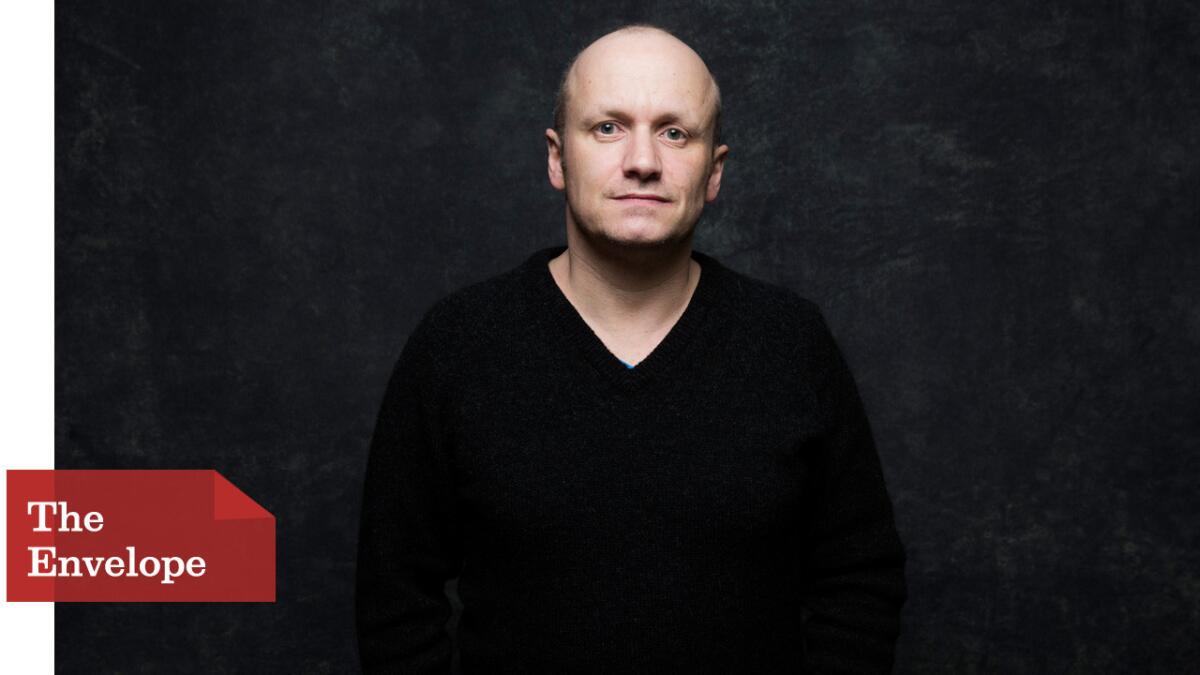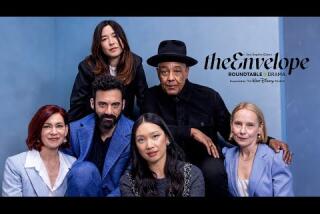‘Room’ director Lenny Abrahamson on rewriting your own narrative

Lenny Abrahamson started late in the film business but has captured notice with 2014’s “Frank” and 2015’s much-talked-about “Room.”
NEW YORK CITY — Lenny Abrahamson is a wanted man these days. The director of “Room” may have gotten a late start in the business (he made his first feature in his late 30s), but he’s more than making up for lost time since his critically lauded adaptation of Emma Donoghue’s 2010 novel has stirred Oscar buzz. So when he was a little late for a chat with The Envelope, who could complain? After all, he wasn’t quite finished meeting with Keira Knightley yet.
That’s a tough act to follow. So are you looking to work with Keira at some point?
In principle. There is something luminous about her. I like actors, so it’s good to know who you like so that in the future you have this bank of humane, decent and talented people. A big part of filmmaking is gathering a group of people you can work with.
How do you know you’ll click?
It’s a gut feeling. You talk with other people who’ve worked with those actors but then you have to leap like anything else. “Room” was a particularly cohesive group, crew and cast.
See more of Entertainment’s top stories on Facebook >>
You all were tight literally and figuratively, particularly doing the shots inside Room itself, right?
For Jack [Jacob Tremblay], the reality of that room was important. That’s where we were for the first four or five weeks of the shoot. I decided not to “fly out” walls, so the production designer [Ethan Tobin] and I came up with a system of panels — every four of those cork tiles that line the room was removable. We could shoot any angle, and we could do it without disrupting the integrity of the set.
How important is set geography to your films?
This was the most thought per square foot of set I’ve ever worked on. We had to find a way to make this 11-by-11 room feel like it had separate spaces in it. And my type of filmmaking anyway is to try to disappear or be invisible.
Tremblay is amazing but young. How did you guide him through his scenes?
It’s like teaching someone to ride a bike — they’ll wobble and wobble and suddenly they’re cycling into the distance. There would be scenes where he’d hold it miraculously for a page or two, but a lot of the time it was like working with a mosaic or pixels. Small chunks. Sometimes I would talk him gently through a take, not about what was happening, but how great it all was. I’d want him to de-focus and drift away and listen to me.
“Room” is very different from your other films, like “Frank” with Michael Fassbender. How was it different for you to make it?
It’s different in some senses, but there are similarities. I’m interested in discontinuities and interruptions, people having to rewrite the narrative of their lives because of sudden changes. This was me stepping into something that I knew from the beginning would have a different kind of audience and profile [from my other films], but otherwise I approach it all the same. I try to interrupt the clichés and find a fresh immediacy to the thing.
Do you think you’re interested in people rewriting their own narrative because you did it yourself — abandoning a philosophy degree at Stanford to come home to Dublin to make movies?
I think so. I have decided what to do with my life, and in a sense I now know who I am. But I’m always thinking there should be some huge change. I’m fascinated by people who have to reinvent themselves. I did it a few times — I was going to be a physicist before I was passionate about philosophy — and I realized that one more change and I’m going to start looking like a dilettante.
So what changed?
Now I’ve got kids [ages 4 and 7], so it was important for me to make some moves that I couldn’t reverse. Kids are the ultimate irreversible thing. That gives a certain weight to your life, and the weight is good, but there’s still part of me that thinks late at night we could sell the house and find a more authentic way of living. I keep thinking I’m going to kick the door down and walk into a brighter future. Narnia is still beyond the wardrobe.
More to Read
From the Oscars to the Emmys.
Get the Envelope newsletter for exclusive awards season coverage, behind-the-scenes stories from the Envelope podcast and columnist Glenn Whipp’s must-read analysis.
You may occasionally receive promotional content from the Los Angeles Times.







